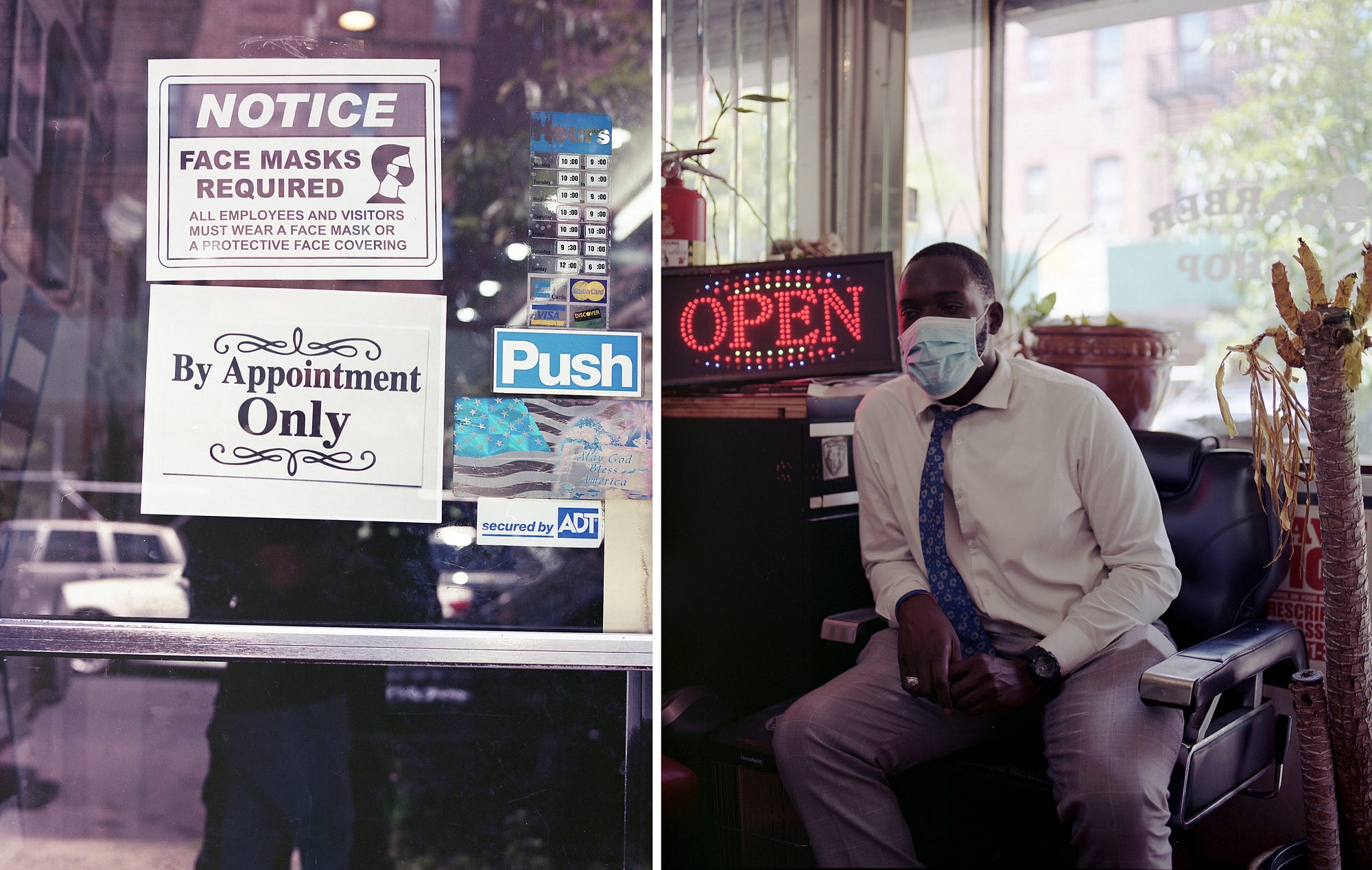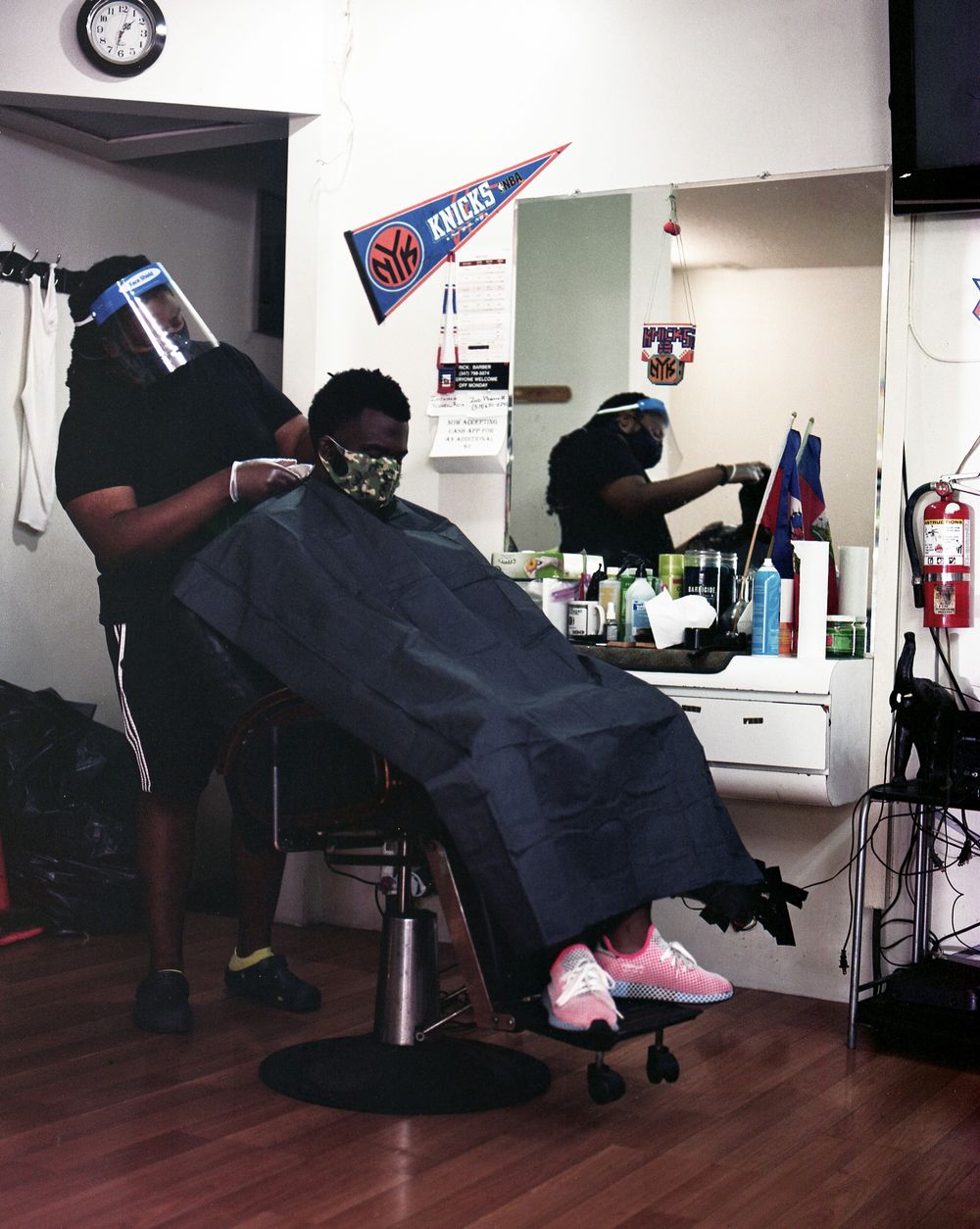Buzz. Buzz. Door opening. Door closing. Feet shuffling. Buzz. Buzz.
Before Covid-19 became the invisible dictator of the world, the sounds of business would barely cut through the banter and movie soundtracks that filled Crown Heights mainstay barbershop X-Clusive. When I walked into X-Clusive the afternoon of June 22, the first day barbershops were allowed to reopen in New York City, they reverberated loudly — and the silence that lurked behind them spoke volumes.
Only one barber was handling cuts, a third of X-Clusive’s usual stable: Danston, known as Yes, was decked out in a face shield and gloves, tending to a masked customer while two others silently waited their turn. In the more than 15 years I’ve been visiting X-Clusive, I can count on one hand the number of times there were few enough people inside for me to count them all on one hand. Yet, under New York City’s “phase two” reopening guidelines, barbershops can only operate at 50% capacity, so X-Clusive implemented an “appointments only” mandate. No more hanging around waiting for your turn to get cut.
My first visit to a barbershop in more than three months felt voyeuristic, as if I were intruding on someone’s private transformation or peeking into a business still under reconstruction.
The TV was off. The only sounds were the music emanating faintly from Yes’ cell phone and sporadic, halting conversation. My first visit to a barbershop in more than three months felt voyeuristic, as if I were intruding on someone’s private transformation or peeking into a business still under reconstruction. I left thinking that coming back the next day would somehow restore X-Clusive to its former convivial atmosphere.
It didn’t.
In fact, everywhere my eyes fell confirmed to me how things had changed since March. A bottle of disinfectant bleach amidst the clippers and blades; barbers showering chairs in disinfectant spray as soon as customers vacated them; a gaping empty space between the two leather lounge seats in order to enforce social distancing for those waiting. Before the pandemic, the glass door entrance greeted people with a look into the happenings of the shop. Now, that sight is obstructed by signs announcing the requirements that everyone entering wears a mask and schedules an appointment.
But Covid-19’s invisible impact was perhaps most of all felt in the absence of X-Clusive’s soul: shop owner Gerard “Dee” Louisias Jr. His station, closest to the door, stood empty. One customer mentioned that Dee had called him to say that he was recovering from an ailment and would be back to the shop soon. Longtime X-Clusive barber Ricardo Benoit, who had joined Yes for the weekend crowd, confirmed as much in a hushed tone.

Benoit is the verbose conductor of the LeBron hate train, the disseminator of obscure YouTube videos, the man with the full-teeth smile that only recedes when deeply concentrating on a cut. His phone started buzzing, he says, as soon as Gov. Andrew Cuomo announced that barbershops would be able to reopen as part of phase two. The day before he returned, the first half of his day was already booked.
The demand is no surprise; the 32-year-old Haitian American barber made house calls during the pandemic. (“Five or six houses a day, and each house had maybe three or four people in there.”) With Dee gone — “He told me it’s my time now. I’ve been here for 10 years,” Benoit says — he is X-Clusive’s preserver of normalcy.
People like George Boston, 64, returned because the shop is family. Asked how long he’s been coming to the shop, he only remembers the answer — 15 years — by asking one of the barbers. “[X-Clusive is] very important to the community. Not only is it environmentally friendly, it’s very informative. You hear different conversations,” Boston told me after having his first haircut in months. “As you can see, it’s clean, and they stick with the program as far as wearing a mask, and they spray you with enough stuff to kill the virus.”
People like my father, a 59-year-old born-and-bred Brooklynite, returned because the pandemic had put years on him he didn’t want. “I never really had that much hair on my head and face,” he said. “When I went outside with all of that hair on my face, I felt like I was old. I didn’t feel comfortable,” he said. When he rose from his chair, his caesar cut light enough to shave off 10 years, he felt like a new man.

For me, I returned to X-Clusive as reflexively as going to the bathroom; my body called for it and I answered. Benoit shaped my dark caesar cut, both of us in masks — in fact, after I instinctively removed mine before sitting down, he told me I couldn’t get a cut without it on. When he needed to cut around my ear, he asked me to remove just that side of the mask until he moved on.
The mask came off fully only for the five minutes he needed to cut my newly formed pandemic beard. I noticed how long it took because I couldn’t not notice: My internal clock, hyperaware of being in public without a mask, counted every second. The threat of Covid-19 had stripped away one of a haircut’s most therapeutic properties: forgetfulness. Outside of occasional mirror checks, a haircut at your regular barbershop is the rare time when a Black man doesn’t have to worry about who or what is changing him because he knows it’s for the best.
To his credit, Benoit kept the mood light and customers feeling safe. When George Boston called the alcohol sprayed on the customer’s completed haircuts a “corona killer,” Benoit jocularly responded, “Corona can’t live in here. That shit gon’ die.”
But there was no mistaking that things had changed. Typically, scheduling an appointment is as quick as popping your head in the door, asking a barber, “How many do you have?” and asking to be added to the queue. It takes longer to order a Frappuccino from the Starbucks five minutes away. While I was in the seat, a regular customer fell back into those old instincts: He popped his head in the door, mask lowered under his mouth, and asked Benoit to give him a number of people ahead of him.
What followed is practically unheard of in Brooklyn barbershops. First, the customer was told to come inside and close the door. Next, Benoit told him there was “none of that ‘how many we got’ anymore,” eliciting an audible shocked grunt from the patron. X-Clusive was appointment-only from now on, Benoit said — but turned the man’s eagerness to silence by informing him he didn’t have an open spot until 3 p.m. the next day.

The first week of reopening saw X-Clusive finding its footing again; Benoit estimates the shop averaged 20–30 customers a day in its first week, similar to the shop’s levels in March just before New York implemented closures of nonessential businesses. While operating hours officially lasted until 9:30 p.m. or later, on Sunday, X-Clusive’s gates were lowered before 8 p.m. for the first time I can remember — yet, for Benoit, the early closure is a testament to the efficiency of the shop’s new pandemic-imposed system, which he says he plans to carry over even when New York City fully reopens.
X-Clusive weathered two pandemics, a city-wide blackout, decades of gentrification, and still, it stood. While Covid-19 has felled companies once believed to be too big to fail — Hertz, LATAM Airlines, and Neiman Marcus Group are all filing for bankruptcy — the Brooklyn mainstay is still servicing the community as it always has. Even if it doesn’t feel like it always did.
